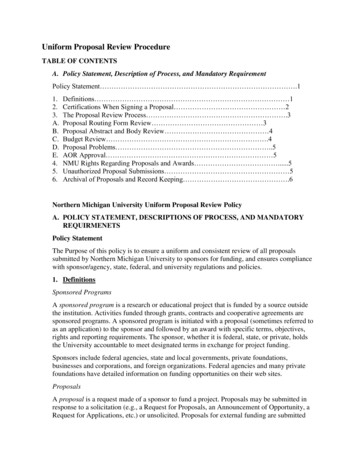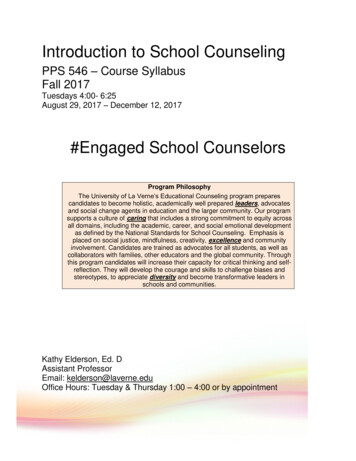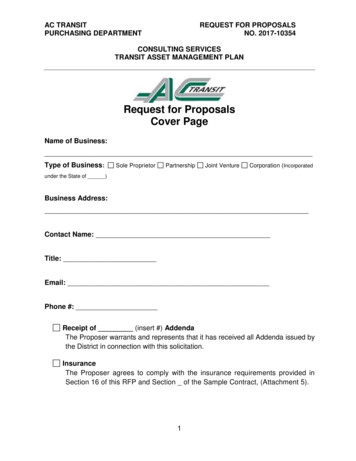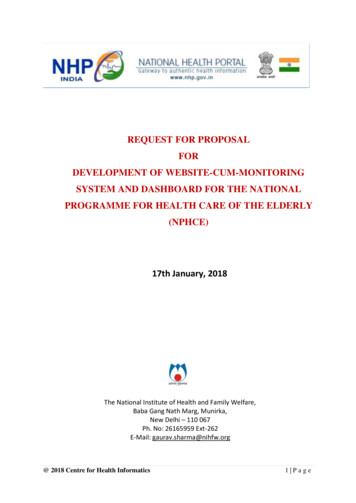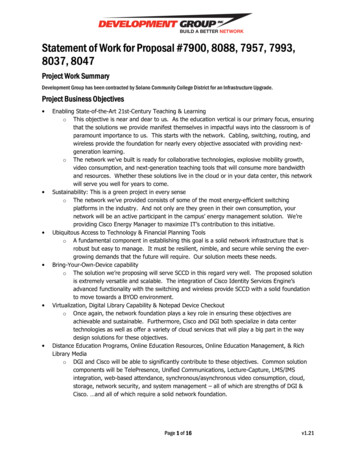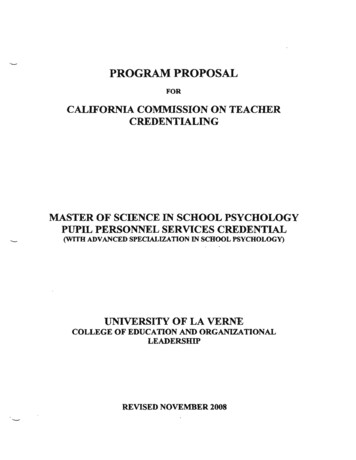
Transcription
PROGRAM PROPOSALFORCALIFORNIA COMMISSION ON TEACHERCREDENTIALINGMASTER OF SCIENCE IN SCHOOL PSYCHOLOGYPUPIL PERSONNEL SERVICES CREDENTIAL(WITH ADVANCED SPECIALIZATION IN SCHOOL PSYCHOLOGy)UNIVERSITY OF LA VERNECOLLEGE OF EDUCATION AND ORGANIZATIONALLEADERSIDPREVISED NOVEMBER 2008
VOLUME IPROGRAM OVERVIEWGENERIC PROGRAM STANDARDSSCHOOL PSYCHOLOGY SPECIALIZATION STANDARDSCOMMON STANDARDS FOR INTERNSHIP PROGRAMSAND PUPIL PERSONNEL SERVICES
UNIVERSITY OF LA VERNECollege of Education and Organizational LeadershipSchool Psychology Preparation ProgramINITIAL PROGRAM PROPOSAL CONTRIBUTORSIt would have been impossible to complete the Program Proposal for the Pupil PersonnelSetVices Credential in School Psychology. including the Internship Credential, withoutthe cooperation, dedication, and expertise of the contributors. The contributors haveexpertise as practitioners in the fields of counseling and school psychology, in countyoffices of education, in higher education, and as subject matter specialists.Steering CommitteeJackie Allen, Ed.D.-Dr. Allen is Associate Professor at the University of La Vernewhere she teaches School Safety and Crisis Prevention, Supervision, and the leaddeveloper of the School Psychology Preparation Program. She previously was anEducation Programs Consultant in School Counseling and School Psychology at theCalifornia Department of Education and Core Adjunct Faculty at National UniversitySacramento Campus. She has served as the President of the American School CounselorAssociation, President of the California Association for Counseling and Development,President of the California School Counselor Association, Chair of the CaliforniaAlliance for Pupil Service Organizations, and is the Editor of the California &hoolCounselor. Prior to her career in higher education, Dr. Allen served as a teacher,counselor, and school psychologist for over thirty years in several California publicschool districts.Lynne Aung, Ed.D. Dr. Aung was a practicing school psychologist in the San DiegoCity School District and adjunct faculty at Chapman Univer.;ity. She is a Past Presidentof the California Association of School Psychologists and has provided leadership inCASP for the last ten years. Prior to working as a school psychologist, she was a schoolteacher, counselor and vice principal.Robert D. Hansen, Ed.D.-Dr. Hansen is Professor of Education and Chair of theSchool Counseling Program at the University of La Verne where he teaches courses inIntroduction to School Counseling, Career Development, School Guidance Seminar,School Law, and Organizational Leadership and School-Community Collaboration. Hehas served on the executive boards of both the California School Counseling Associationand the California Association of School Counselors, and is Past President of theCalifornia Association of Counselor Education and Supervision. Prior to his career inhigher education, Dr. Hansen served as a teacher and counselor through superintendentfor thirty years in five California public school districts.Laura Wiggins, MFf, LEP- Mrs. Wiggins is a University Supervisor ofFieldExperience for the University of La Verne. She also trains new university supervisors.
Prior to coming to the University, she served as a teacher, counselor. school psychologist,director of student services. and SELPA Director in several California school districts.Other ContributorsJean Albaum, MIT, LEP, Ph.D.-Dr. Albawn is a counselor aod school psychologistfor the Claremont Unified School District. She is a Senior Adjunct Professor Education atthe University ofla Verne where she teaches Counseling Diverse Populations.Robert Burns, Ed.D.-Dr. Burns is Professor of Education at the University ofl.aVerne where he teaches Educational Assessment.Linda C. Hansen, Ed.D.-Mrs. Hansen is Coordinator of State and Federal Projects andESL for the Walnut Valley Unified School District. She is on the adjunct faculty atAzusa-Pacific University and the University of Califomia, Los Angeles where sheteaches courses in culture, second language acquisition, and curriculum and instruction.Thomas McGuire, Ed.D.-Dr. McGuire is Professor of Education and Chair of theEducation Department at the University ofl.a Verne where he teaches courses inEducational Research and Graduate Seminar.Barbara Nicoll, Ph.D.-Dr. Nicoll is Professor of Education at the University of LaVerne where she teaches courses in Hwnan Development and Educational Psychology.Michael Pines, Ph.D.- Dr. Pines is a retired Consultant, Emergency Mental HealthServices, Los Angeles County Office of Education and currently providing consultationin crisis management and suicide prevention through the Pines Institute.Robert Tyro, M.A.-Mr. Tyra is Consultant, Counseling, Guidance, and School·toCareer Programs for the Los Angeles County Office of Education. He is a nationaltrainer for the American School Counseling Association on the National Standards forSchool Counseling. He is the creator of the Student Support Accountability Report Card(SPARC). Mr. Tyra is also on the adjunct faculty at California State University, LosAngeles. Prior to becoming a county office consultant, he served as a teacher, counselor,and assistant principal.Loretta Whitson, M.S.-Ms. Whitson is Director of Student Support Services for theMomovia Unified School District. She is an Adjunct Professor of Education at theUniversity ofl.a Verne where she teaches Facilitation/Consultation Skills. Ms. Whitsonis currently the Executive Director of the California Association of School Counselorsaod served as President of the California Association of School Counselors and theCalifornia School Counselor Association. From 1998·2000 she served on the PupilPersonnel Services Advisory Panel for Pupil Services Standards of Prognun Qnality aodEffectiveness, California Commission on Teacher Credentialing. She is currently acommissioner on the California Commission for Teacher Credentialing representingpupil personnel services.
RECENT PROGRAM CONTRIBUTORSSCHOOL PSYCHOLOGY PROGRAM ADVISORY COMMITTEEDr. Jackie M. Allen, LMFf, NCC, NCSC- is chair of the School Psychology Programand was the lead developer of the program. Dr. Allen is Associate Professor at theUniversity of La Verne and has taught all the school psychology classes in the schoolpsychology program curriculum as well as supervision in counseling and school safetyand crisis prevention. Currently she teaches the assessment classes and LearningDisabilities and Neurology and supervises fieldwork. She previously was an EducationPrograms Consultant in School Counseling and School Psychology at the CaliforniaDepartment of Education and Core Adjunct Facu1ty at National University-SacramentoCampus. She has served as the President of the American School Counselor Association,President of the California Association for Counseling and Development. President of theCalifornia School Counselor Association, Chair of the California Alliance for PupilService Organizations, and is the Editor of the California School Counselor. Sherecently authored Empowering the 21# Century Professional School Counselor. Dr. Allenis a member of the California Commission on Teacher CredentiaJing Board ofInstitutional Review. Prior to her career in higher education, Dr. Allen served as ateacher, counselor, and school psychologist for over thirty years in several Californiapublic school districts. She is a certified neuropsychologist.Sam Bauman, M.S.- is a school psychologist in the Glendora Unified School District.He is a doctoral student at Claremont Graduate School and is completing his di ssertationwith his study in Response to Intervention. He is a former school counselor. He isadjunct faculty for the School Psychology Program at the University of La Verne andteaches Individual Counseling Skills and Group Counseling Skills and supervisesstudents in Practicum A.Dr. Liza CariUo- Dr. Carillo is head psychologist in the Claremont Unified SchoolDistrict. She is a certified neuropsychologist.Cindy Cary, M.Ed.- (Doctoral candidate) Cindy Carey is an Assistant Professor ofEducation at the University of La Verne. She teaches in the child development programand is the Early Childhood Supervisor at the FaiJplex Child Development Center. Shewas a former preschool teacher, director of a preschool, and an elementary schoolteacher.Dr. Barbara Fraley, LMFf- Dr. Fraley is a school psychologist in the Pomona UnifiedSchool District. She is adjunct faculty for the School Psychology Program at theUniversity of La Verne and teaches Counseling Theories, Child Psychopathology, andsupervises students in Practicum B. She has taught counseling. parent education, andschool psychology classes at several institutions of higher education.'-
Roger McCoy, M.S.- Roger McCoy is a school psychologist for Riverside County. Hehas been the Region Representative for Riverside County for the California Associationof School Psychologists and is the current program chair of the 2009 CASP Conference.Roger is adjunct faculty for the School Psychology Program at the University of LaVerne and has taught Introduction to School Psychology, Counseling Theories, andsupervised students in Practicwn A.Dr. Veronica Runnels,. LEP -Dr. Runnels is a school psychologist in the Newport MesaSchool District and has been a program specialist in Corona Norco School District. Sheis adjunct faculty in the School Psychology Program at the University of La Verne andteaches Introduction to School Psychology and Program Planning and Assessment. Shealso supervises Practicum B students.Dr. Michael Salce, LEP- Dr. Salce is a school psychologist in the Baldwin Park SchoolDistrict. He is adjunct faculty in the School Psychology Program at the University of LaVerne and teaches School Safety and Crisis Prevention and supervises Practicum Astudents.Dr. Regina Schaefer, LMFf- Dr. Schaefer is Associate Professor at the University ofLa Verne where she teaches Counseling Diverse Populations in the School PsychologyProgram and Facilitation, Consultation. and Collaboration classes in the EducationalCounseling Program and supervises the fieldwork program for the on campus counselingstudents. She is a former school counselor.
TABLE OF CONTENTSPROGRAM PROPOSAL CONTRIBUTORSPART I - RESPONSES TO THE COMMON STANDARDSPART n - PROGRAM OVERVIEWPART m- GENERIC PROGRAM STANDARDS 1-16PART IV - SCHOOL PSYCHOLOGY SPECIALIZATIONSTANDARDS 17-27PART V - COMMON STANDARDS FOR INTERNSHIPPROGRAMS AND PUPIL PERSONNEL SERVICES 1-8
PART IPROGRAM OVERVIEW
PART ISCHOOL PSYCHOLOGIST PREPARATION PROGRAM OVERVIEWI.The Pupil Personnel Services Credential in School Psychology will consist ofsixty-one (61) semester units of course work.2.Students who complete the program will receive both the Master of Science inSchool Psychology and the Pupil Personnel Services Credential in SchoolPsychology.3.There will be twenty-three (23) cow.es required in the School PsychologyPreparation Program, including 450 hours of practicum and 1,200 hours ofsupervised field work experience (See Appendices A-U for course Outlines andSyllabi Templates).4.Table I displays the recommended sequence of courses for the SchoolPsychology Preparation Program. As can seen, the program can be completedin nine or ten semesters.5.Table n displays the recommended sequence of courses for those candidates whohave already completed the Pupil Personnel Services Credential in SchoolCounseling. The program can be completed in five or six semesters.6.Table ill is a Curriculum Alignment Matrix for Generic Program Standards. Itmatches the sixteen (16) Generic Program Standards with specific courses in theSchool Psychology Preparation Program. The Generic Program Standards willbe addressed in depth in Part n of this document.7.Table IY is a Curriculum Alignment Matrix for the Scbool PsycbologySpeeialization Standards. It matches the eleven (II) School PsychologySpecialization Standards with specific courses in the School PsychologyPreparation Program. The Sebool Psychology Speeialization Standards will beaddressed in detail in Part m of this document.8.The Pupil Personnel Services Internship Credential with Specialization inSchool Psychology is discussed in Part IV of this document WIder CommonStandards for Internsbip Programs and Pupil Personnel Services.9.The Appendices A througb Z contained in Volume n include course outlinesand syllabi templates for all courses in the program, Professional Portfolios forSchool Psychology CandidJlles, Handbook for School Psychologist Trainees,Handbookfor On-Sile Supervisors, Handbookfor University Supervisors ofF ld ,ience, Handbook/or I"ternship Programs, and Memorandum ofUnderstanding for School Psychology Internship Program.
(((UNIVERSITY OF LA VERNECollege of Education and Organizational LeadenohlpTable ISCHOOL PSYCHOLOGY PREPARATION PROGRAMRECOMMENDED SEQUENCE OF COURSESGeneralCoursesFallY,.r 1SpringFallY.ar2SpringYear 1SummerYear 1Educ 501Educ 550Ve.r2SummerYear 2Yaer3SpringVaar3Educ 547Educ 503Educ 502Educ 573Educ 574Educ 554Educ 579Educ 598Educ 549Educ 572Educ 504Educ 578Educ 548Educ 571Educ 577FallSummerYear 3Educ 567Educ 535,I6 unllsEduc586A(PracticumA Cont.)(PracticumA Cont.)Educ 586810 unlls9 unlls6 unlls10 unlls(Practicum 8 (Practicum 8Cont.)Cont.)Educ 589A6 unils2 unlls7 unllsEduc 58985 un lis(Field WorkCont)
(((UNIVERSITY OF LA VERNECollege of Education and Organizational LeadershipTable IISCHOOL PSYCHOLOGY PREPARATION PROGRAM(For Siudents with PPS Credential in School Counseling)RECOMMENDED SEqUENCE OF COURSESFallVe.r 1SpringVear1SummerEduc 547Educ 535Educ 58687 unitsVear1FallYaar2SpringVear2Educ 548Educ 502Educ 579Educ 598Educ 577Educ 578{Practicum B (Practicum 8Educ 589AConI.)ConI.)6 units6 units5 unitsEduc 58985 unitsSummerYear 2(Field WorkContI
UNIVERSITY OF LA VERNECollege of Education and Organizational LeadershipSCHOOL PSYCHOLOGY PREPARATION PROGRAMCOURSE TITLESCoune NumberEduc 501Educ 502Educ 503Educ504Educ 535Educ 547Educ 548Educ 549Educ 550Educ 564Educ 567Educ 57JEduc 572Educ 573Educ 574Educ 577Educ 578Educ 579Educ 586A&BEduc589 A&BEduc 598Educational AssessmentLearning Disabilities and NeurologyEducational PsychologyMeiliodsofResewxhChild PsychopathologyIntroduction to School PsychologyProgram Planning and EvaluationSchool Counseling TheoriesHuman DevelopmentInstruction and AchievementSchool Safety and Crisis PreventionIndividual Counseling SkillsGroup Counseling SkillsCounseling Diverse PopulationsFacilitation, Consultation, and Collaboration SkillsIndividual Assessment3333333332233333Advanced Assessment3Alternative Assessment and Behavior Intervention 3Practicum A & B2Supervised Field Work- Levels I & n4Graduate Seminar in School Psychology3
PART IIGENERIC PROGRAM STANDARDS
STANDARDlPROGRAM DESIGN, RATIONALE AND COORDINATIONThe program is coordinated effectively in accordance with a cohesive design that has acogent rationale. Foundation and theoretical courses precede and are designed to betaken prior to more specialized and advanced courses.Rationale and Aims oftbe School Psychology Preparation Program:The Mission Statement of the University of La Verne declares that, "Graduate programsat ULV are . aimed at the pmcticing professional. and seek to integrate theory andpractice." The University is committed philosophically to emphasize four major areas 'that affirm a positive and rewarding life for its students: a values orientation, communityand diversity, lifelong learning, and community service." The tenets contained in theMission Statement are fully embraced by the College of Education and OrganizationalLeadership.The University has a strong commitment to being a leader in the field of education. TheDepartment of Education at the University of La Verne celebrated its Diamond Jubilee onJune 29, 2002. Elementary and junior high school teaching credentials were first offeredin 1927. They were followed by programs in secondary teaching, reading, earlychildhood education, administration, and special education. The Pupil PersonnelServices Credential has been offered at the University since 1974.The School Psychology Preparation Program is designed to meet the standards for theCalifornia Commission on Teacher Credentialing for the Pupil Personnel ServicesCredential in School Psychology, including the Internship Credential, and therequirements for the Master of Science in School Psychology. Graduates of the programwill be able to effectively fimction at any entry-level position as a professional schoolpsychologist. The School Psychology Preparation Program strongly embraces theNational Association of School Psychologists (NASP) donutins of school psychologytraining and practice standards. It is expected that program graduates will continueprofessional development throughout their careers as school psychologists.Expectations for Graduates of the School Psychology Preparation Program:By the conclusion of the School Psychology Preparation Program, it is expected that allprogram graduates will be able to:I. Provide psychological services in grades 12 and below, including preschool, andin programs organized primarily for adults;2. Provide services that enhance acadentic performance;3. Design slrategies and programs to address problems of adjustment;4. Consult with other educators and parents on issues of social development,behavioral and acadentic difficulties;
5. Conduct psycho-educational assessments for purposes of identifying specialneeds;6. Provide psychological counseling for individuals, groups and families;7. Coordinate intervention strategies for management of individual and school-widecnses;8. Continually increase their socio-cultural competence by recognizing that it is anactive and ongoing process;9. Develop a professional identity by engaging in ongoing professionaldevelopment;10. Effectively utilize technology, especially the resources on the World Wide Web;11. Professionally apply relevant laws and ethical standards.How Scbool PSYchology Candidates Are Systematically Assessed on an OngoingBasis:School psychology candidates are systematically assessed on an ongoing basis in threeways: (l) comprehensive student asse ssment in courses; (2) assessment during practicaand field work; and (3) portfolio assessments.1. Comprehensive Student Assessment Plan in Courses: The Course outlines and SyllabiTemplates for every course contain the following language regarding comprehensivestudent assessment (See Appendices A-U in Volume II of the Proposal):The syUabus developed by the instructor will include the following:1. Specific policies related to classroom attendance2. Weighting of activities in grading (e.g, points)3. Participation in assigned field trips and classroom presentations4. Assigned researcb papers, and other writing assignments, or projectsS. Examinations, papers, and/or projeds based upon the learning outcomesnoted6. Statement regarding academic honesty7. In addition, part of tbe evaluation shaD include tbe foUowing documents tobe turned in to the instructor at tbe conclusion of tbe course:a. Evidence of how and to wbat extent kDowledg experiences, and/orskills under each learning objective in tbe course outline were met bythe student.b. Statement of self·reOection on expectations/needs for future growtbunder eacb of the learning outcomes in the course. If none is neededunder a specific learning outcome, "not applicable" should be writtenby the student.e. Students are to be specific and detailed under 7a. and 7b. above.After being critiqued by tbe instructor, tbese documents are to be signed, dated, andreturned to tbe student in order tbat tbey can be placed in tbe student's ExitPortfolio for School Psychology Candid.t. (See Number 3 below).2
2. Assessment dumg Practica: School psychology candidates are given writtenfonnative and swnmative assessment during practica by university supervisors (SeeAppendices in Volume IT of the Proposal). In addition students will be given a "credit"or "no credit" grade at the completion of Education 586A and 5868.3. As.ment during Field Work: School psychology candidates are given writtenformative and swnmative assessments during field work by both university supervisorsand on-site supervisors (See Appendices X and Y in Volume II of the Proposal). Inaddition, students will be given a "credit" or "no credit" grade at the completion ofEducation 589A and 589B.4. Portfolio A.ments: In Graduate Seminar in School Psychology, schoolpsychology candidates demonstrate their knowledge, experiences, and/or skills gained inthe entire School Psychology Preparntion Program by means of developing an ExitPortfolio which includes nwnerous artifacts. The Portfolio is started during the firstcourse in the program and then added to in subsequent courses. It includes ademonstration of student competence for all courses in the school psychology preparationprogram, practica, supervised field work, and a culminating essay.In addition, school psychology candidates also develop a Professional EmploymentPortfolio containing a professional chronological resume, cover letter for a schoolpsychology position, personal philosophy of school psychology, and delivery of schoolpsychology services. (See Appendices in Volume IT of the Proposal).Students will be given a "credit" or ''no credit" grade at the completion of Education 598.Scope and Sequence of Courses (See Tables I and n in Part D:During the first year, the following courses four (4) general courses are taken:Education 550-Hwnan DevelopmentEducation 503-Educational PsychologyEducation 535-Child PsychopathologyEducation 502-Leaming Disabilities and NeurologyThe following six (6) school psychology foundation and theory courses are taken duringthe first and second years:Education 547-Introduction to School Psychology (Law & Ethics)Education 549-Theories of CounselingEducation 571- Individnal Counseling SkillsEducation 572---Droup Counseling SkillsEducation 573---Counseling Diverse PopulationsEducation 504--Methods of ResearchStarting in the second semester of the tim year candidates begin to take the followingseven (7) specialized assessment courses and other advanced courses in the SchoolPsychology Preparation Program including:Education 548-Program Planning and Evaluation3
Education 577-Individual AssessmentEducation 578-Advanced AssessmentEducation 579- Alternative Assessment and Behavior InterventionsEducation 567-School Safety and Crisis PreventionEducation 574-Leadership, Consultation, and CollaborationEducation 59&-Graduate Seminar in School PsychologyFour (4) collateral classes with emphasis on education, learning, and educationalleadership are integrated throughout the program:Education 501 - Educational AssessmentEducation 503-Educational PsychologyEducation 5SO-Hwnan DevelopmentEducation 564-lnstruction and AchievementThe course outlines and syllabi templates in Appendices A-U clearly delineateprerequisites and co-requisites required for all classes.Practica:Four hundred and fifty (450) hours ofPractica are required before beginning field work.Practica consists of a series of supervised experiences that occur prior to the field work,are conducted in laboratory and/or field-based settings, and provide for the application ofkoowledge and mastery of distinct skills. (See Appendix S for Course Outline andSyllabus Template)Supervised Field Work:As has been previously stated, after the completion of the four hundred and fifty (450)hours ofPractica and Education 574, 573, Planning and Evaluation, IndividualAssessment, and Advanced Assessment, Supervised Field Work under the direction of aUniversity Supervisor ofField Work Experience may be started. These two courses(Supervised Field Work Level I & II) are divided into 600 clock hours offield work percourse, for a total of 1,200 hours. Learning outcomes are outlined in Appendix T.Academic and AdmiDistrative Ovenight:The Chair of the School Psychology Preparation Program has anademic oversightresponsibilities over the program. The administrative oversight of the program rests withthe Chair of the Education Department and the Dean of the College of Education andOrganizatioual Leadership.Admissions and Advisement:The Chair of the School Psychology Program is responsible for admitting all studentsinto the School Psychology Preparation Program. The chair also provides advisement tostudents.4
Program Evaluation and Needed Modifications:The program is evaluated annually by the Chair of the School Psychology PreparationProgram, program faculty, School Psychology Program Advisory Committee, Chair ofthe Education Department, and Dean of the College of Education and OrganizationalLeadership. In addition, students evaluate the program in focus groups, at the conclusionof their program, and after they secure employment in school psychology. Neededprogrammatic modifications (e.g., course content due to changes in the educationallandscape in California and the nation and student recommendations) are made annually.Candidate Assessment:Candidates are assessed on an on-going basis by instructors in the program, by theUniversity Supervisor ofField Experience. and by school psychology site supervisorsduring field work.Coordination between Program Faculty and Staff and Local Districts and Schools:Full-time faculty in the School Psychology Preparation Program are chosen by theEducation Department staff and Dean of the College of Education and OrganizationalLeadership with input from the Chair of the Scbool Psycbology Preparation Program. Allpart-time faculty members are hired and supervised by the Chair of the SchoolPsychology Preparation Program.Full-time program faculty meet at least on a bi-monthly basis. Part-time faculty meetingsare held bi-annually. In addition, part-time instructors receive course outlines and syllabitemplates prior to teaching a course. On-going support from the program chair isprovided when needed.Five (5) of the courses offered in the program are taken with students in the largerEducation Department and active collaboration occurs between the School PsychologyProgram and the Special Education Program. Both of these entities are in the CoUege ofEducation and Organizational Leadership. Thus. there is a seamless movement ofcandidates throughout the program.University Supervisors ofField Experience interact on a regular basis withrepresentatives from institutions and local school districts to ensure that a student's fieldwork experience is effectively coordinated.5
STANDARD 2GROWTH AND DEVELOPMENTThe program provides candidates with opportunities and experiences to acquire anunderstanding of typical and atypical growth and development, including relevanttheories, research, and other infonnation related to pupils' strengths and weaknesses thataffect learning in schools, community and family environments. The program providescandidates with an understanding of the effects of (a) health and developmental factors,(b) language, (c) cultural variables, (d) diversity, (e) socioeconomic status, and (I) factorsof resiliency on pupil development.This standard is met primarily by Education SSO-Human Development (SeeAppendix G for Course Outline and Syllabus Template) and secondarily byEducation SOl-Educational Psychology (See Appendix B for Coune Outline andSyllabus Template), Education 573-Counseliog Diverse Populations (See AppendixL for Coune Outline and Syllabus Template), and Education SOl-LearningDisabilities and Neurology (See Appendix E for Course Oui6ne and SyUabusTemplate).Course Description for Education 550: This course is a review of life-span humandevelopment that includes the physical, social-emotional, factors of resiliency, cognitive,cultural, economic and environmental factors that interact to promote or hinderdevelopment. Current theory and research, which relates to typical and atypicaldevelopmental patterns and their effect on studentleaming, will be studied.Course Description for Education 503: This course covers theories and practicesrelated to the psychology ofleaming, including issues such as cognition, memory,attention, perception, emotion, motivation, organization, gender. culture and language,self-esteem, and other learning differences. Strategies for promoting academic success aswell as prevention and early intervention strategies will be reviewed. Classroommanagement theory and practice will be integrated with an understanding of the entirelearning community's contribution to student success.Course Description for Education 573: lIDs course is an examination of diversity in aschool setting from the culture-general to the culture-specific. Emphasis is placed onpreviously learned counseling skills as applied to culturally diverse populationsincluding, but not limited to, raciaVethnic, socio-economic status, environmental factors,religious, sexual orientation, differently abled, educationally handicapped, and children innon-traditional homes.Course Description for Education 502: lIDs course emphasizes basic knowledge ofneurology as it pertains to learning disabilities. A balance of theoretical background andcurrent research wiU be stndied.1
Evidence of Learning Outcomes from Course OutliDe and Syllabus TemplateDesigned to Meet Standard 2 and Address "Questions to Consider" for theStandard:1.Understanding of typical and atypical growth and development-Demonstrate knowledge and understanding of the life-long sequential aspects andmechanisms of the developmental process by studying the factors for typical and atypicalindividuals. (Education 550)Identify atypical patterns of development (risk factors) that limit an individual' s potentialgrowth such as bullying, aggressiveness, limited language, stereotyping, discrimination,negative school climate, or anti-social behavior and develop programs, which canpromote JXlsitive psychosocial and cognitive outcomes. (Education SSO)Discuss and analyze the exceptionalities of
The Pupil Personnel Services Credential in School Psychology will consist of sixty-one (61) semester units of course work. . School Psychology and the Pupil Personnel Services Credential in School Psychology. 3. There will be twenty-three (23) cow.es required in the School Psychology Preparation Program, including 450 hours of practicum and .

